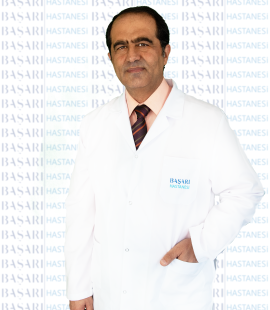What is colonoscopy?
Colonoscopy in İstanbul Basari Hospital is a procedure performed to discover and treat the changes and abnormalities in the large intestine (colon) and rectum.
During a colonoscopy, a long, flexible tube called colonoscope, is placed into the rectum. A small video camera at the end of the colonoscope allows the doctor to see inside the entire large intestine.
If necessary, polyps or other abnormal tissue types seen during colonoscopy can be removed with the use of colonoscope. During a colonoscopy your doctor can also collect biopsy tissues.
Reasons to get a Colonoscopy
Your doctor may recommend colonoscopy for the following reasons:
- Investigation of the cause of intestinal symptoms. With colonoscopy your doctor can discover possible causes of abdominal pain, rectal bleeding, chronic constipation, chronic diarrhea, and other intestinal problems.
- Colon cancer screening. If you're 50 years old or older and at average risk of colon cancer—no colon cancer risk factors other than age—your doctor may recommend a colonoscopy every 10 years or sometimes earlier to screen for colon cancer. Colonoscopy is an option for colon cancer screening.
- Investigation for the presence of polyps. If you have previously developed polyps in your bowel, your doctor may recommend a follow-up colonoscopy to look for any other polyps that may be present and remove them. This type of colonoscopy is performed to decrease your colon cancer risk.
Are There Any Risks of Colonoscopy
Colonoscopy carries very few risks. Rare seen colonoscopy complications include:
- Adverse reaction to the anesthetic used during the procedure
- Bleeding at the site where, a polyp or other abnormal tissue was removed or a tissue sample (biopsy) was taken
- Colon wall or rectum tears
After your doctor discusses the possible risks of colonoscopy with you, he or she will ask you to sign a consent form authorizing the procedure.
Nutrition and Preparation Before Colonoscopy
Your bowel must be clean (empty) before colonoscopy. Any debris in your gut can prevent detailed visualization of your colon and rectum during the exam.
To empty your colon, your doctor may ask you to:
- Follow a special diet before colonoscopy. You should stop consuming solid foods a few days before the colonoscopy. You can consume clear liquids such as water, tea and coffee without milk or cream, broths and sodas. Avoid consuming red colored liquids before a colonoscopy, as it may resemble blood during a colonoscopy. You should not eat or drink anything after midnight the night before a colonoscopy.
- Laxative use. Your doctor may recommend using a laxative, usually in pill or liquid form. You may be asked to take the laxative the night before your colonoscopy, or you may be asked to use the laxative both the night before and the morning of the procedure.
- Use of enema kit. In some cases, you may need to use an enema kit the night before or a few hours before a colonoscopy to empty your colon. This is usually only effective in emptying the lower colon and is not generally recommended as a primary means of emptying your colon.
- Adjusting your regular medications. At least one week before a colonoscopy, tell your doctor about these, especially if you have diabetes, high blood pressure or heart problems, or if you are taking medications or supplements containing iron. Also other drugs that thin the blood such as aspirin or warfarin, newer anticoagulants such as dabigatran or rivaroxaban used to reduce the risk of stroke; Tell your doctor if you are taking heart medications that affect platelets, such as clopidogrel or clopidogrel. You may need to adjust the doses of medications or stop taking them temporarily.
How is colonoscopy done?
You will wear a gown during the colonoscopy. Colonoscopy is usually performed under sedation. In some cases, the sedative is combined with an intravenous pain reliever to minimize any discomfort.
During a colonoscopy, you will usually lie on your side on the examination table with your knees pulled towards your chest. Your doctor will insert a colonoscope into your rectum.
Long enough to reach the entire length of your colon, the colonoscope device contains a light and a tube (channel) that allows the doctor to pump air or carbon dioxide into your colon. Air or carbon dioxide swells the colon, allowing better visibility of the lining of the colon.
When the device is moved or air is introduced, you may experience abdominal cramps or an urge to have a bowel movement.
The colonoscope device also includes a small video camera on its end. The camera sends images to an external monitor so the doctor can examine the inside of your colon.
Your doctor may also insert additional instruments into the colonoscope device to take tissue samples (biopsy) and remove polyps or other abnormal areas.
Colonoscopy procedure usually takes 30 to 60 minutes.
After Colonoscopy
After colonoscopy, it takes approximately one hour for the sedative effect to begin to wear off. You will need someone to drive you home because it may take up to a day for the full effects of the sedative to wear off. Don't drive, make important decisions, or go back to work for the rest of the day.
If your doctor has removed a polyp during your colonoscopy, you may be advised to temporarily eat a special diet.
You may feel bloated or pass gas for a few hours after the examination, as the air in your colon will come out on its own. Walking can help relieve these types of discomfort.
You may also notice a small amount of blood in your toilet during your first bowel movement after the exam. Usually this is not a major problem. Consult your doctor if you continue to have blood or blood clots, or if you have persistent abdominal pain or fever.
Colonoscopy Result
Your doctor will review the colonoscopy result and then share the results with you.
Negative Colonoscopy Result
A colonoscopy result is considered negative if your doctor does not find any abnormalities in the colon.
Your doctor may suggest that you have another colonoscopy within the following time frame:
- In 10 years if you have an average risk of colon cancer (no risk factors for colon cancer other than age)
- In 5 years if polyps were seen in previous colonoscopy procedures
- During the year if there is residual stool in the colon that prevents a full examination of your colon
Positive Colonoscopy Result
A colonoscopy result is considered positive if your doctor finds any polyps or abnormal tissue in the colon.
Most polyps are not cancerous, but some may become cancerous structures. Polyps removed during colonoscopy are sent to the laboratory for pathology analysis to determine whether they are cancerous, precancerous, or noncancerous.
Depending on the size and number of polyps, you may need to follow a stricter surveillance schedule for polyp investigation in the future.
If your doctor finds one or two polyps less than 1 centimeter in diameter, they may recommend having another colonoscopy in five to 10 years, depending on other risk factors for colon cancer.
Your doctor will recommend an earlier colonoscopy if:
- Presence of more than two polyps
- Polyp larger than 1 centimeter
- Polyps and residual stool that prevent a full examination of the colon
- Polyps with certain cell characteristics that indicate a higher risk of future cancer
- Cancerous polyps
If there is a polyp or other abnormal tissue that cannot be removed during a colonoscopy, your doctor may recommend re-examination with a specialist with specific expertise in removing large polyps or surgery.


